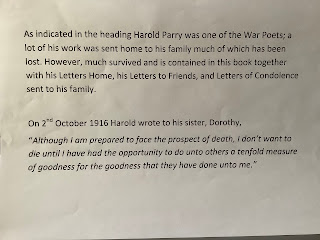Harold was
born one of twins in Bloxwich, Walsall, West Midlands, UK on 13th
December 1896. His parents were David
Ebenezer Parry, a mining engineer and colliery manager, and his wife Sarah, nee
Arkinsall. Harold's siblings were: Donald b. 1891, Dorothy, b. 1892, and Victor, his twin.
Educated
initially at a local preparatory school, Harold went on to Queen Mary’s Grammar
School, Walsall, where he joined the Cadet Corps, wrote poetry and excelled at
cricket and football. He went on to
study at Oxford University.
Harold
volunteered to join the Army in January 1916 and was commissioned as a Second
Lieutenant into the King’s Own Yorkshire Light Infantry. Transferred to the 17th Battalion
of the King’s Royal Rifle Corps, Harold was posted to the Western Front, where
he continued to write poetry.
Harold was
killed on 6th May 1917 at Ypres and was buried in Vlamertinghe Military
Cemetery, West Flanders, Belgium. He is
also commemorated in Field Road Cemetery, Bloxwich.
Harold Parry’s WW1 poetry collection “In Memoriam Harold Parry” - Parry's Poems and Letters, with a Foreword by Geoffrey P. Dennis, was published by W.H. Smith in 1918.
"Tommy's Dwelling"
I come from trenches deep in slime,
Soft slime so sweet and yellow,
And rumble down the steps in time
to souse "some shivering fellow".
I trickle in and trickle out
Of every nook and corner,
And, rushing like some waterspout,
Make many a rat a mourner.
I gather in from near and far
A thousand brooklets swelling,
And laugh aloud a great "Ha, ha!"
To flood poor Tommy's dwelling.
Sources: Catherine W. Reilly “English Poetry of the
First World War – A Bibliography” (St. Martin’s Press, New York, 1978), p. 249.
Find my
Past, Free BMD,
John Vallance, Archivist at Queen Mary’s Grammar School



